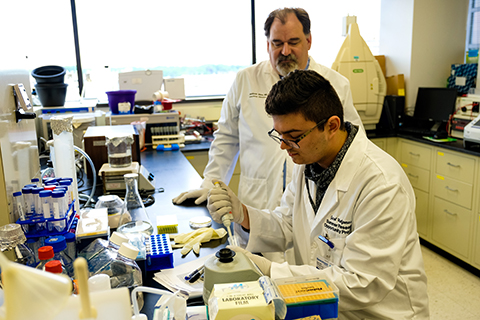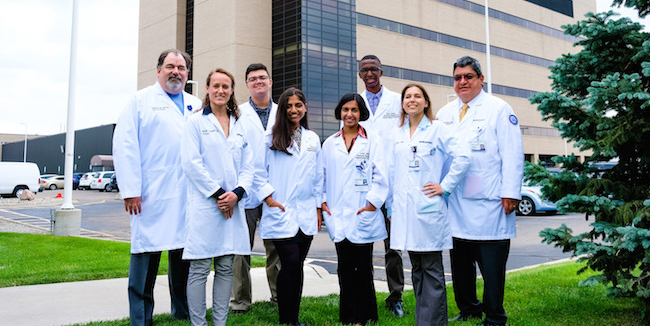
OUWB’s newest pipeline program the Summer Research Opportunity Program (SROP) is a six-week program designed to introduce high school or recently-graduated students to the mechanics of medical research by allowing them to work in laboratories alongside Beaumont medical researchers, assisting them with their current research.
This advanced course is available to only a few students each summer – ones who, according to OUWB Director of Diversity & Inclusion Caryn Reed-Hendon, Ph.D., have submitted an online application, maintained a GPA of 3.0 or above and demonstrated an interest in medical research and health disparities. Preference is given to students who have previously attended the less intense, more inclusive OUWB pipeline program Future Physicians Summer Enrichment Program.
Both pipeline programs aim to introduce students from underprivileged areas to the scope of opportunities available to them within the field of medicine. “Some students with whom I’ve spoken only know about a few possibilities, like becoming a doctor, nurse, physical therapist or a paramedic – all fine professions, but also not the only ones that are out there in the career landscape of health care” says Reed-Hendon.
A participant in the 2018 SROP session and recent graduate of the International Academy of Macomb, Jacob Wielgomas, confirms Reed-Hendon’s suspicion: “I dream of being a doctor,” he says. “I just don’t know what kind of doctor I want to be, due to my lack of knowledge about the field, specifically when it comes to medical disciplines.”
Wielgomas’ interest in research stems from his innovative nature and desire to question everything. In the fall, he will be starting his undergraduate degree at Wayne State University.
A day in the life of a SROP student
Though participants spend the majority of the week at the Beaumont Research Institute with their research mentors, their Mondays are spent with assistant professors Celeste Farr, Ph.D., MPH, and Stephanie Swanberg, MSI, AHIP, and associate professor Misa Mi, Ph.D., M.A., MLIS, AHIP, in the Health Information Literacy component of the program, working on a social determinant of health data project.
When he first started, Wielgomas spent the majority of his time in the lab researching topics on which he needed to have background knowledge. Now, better equipped with the necessary background information, he observes his mentors, offering hands-on assistance whenever he is able. Recently, he has been transferring synovial fluids into tubes from the micro lab; however, each student’s activities will differ, as each been matched with a different project depending on his or her interests.
“The most challenging part to me is understanding all of the biology,” he says. “Sometimes, I feel discouraged due to my lack of knowledge, but I work hard in learning the new topics and mechanisms.”
The Health Information Literacy portion, on the other hand, includes didactic lectures, demonstrations and hands-on activities that prepare students for developing their own research questions, select and cite scholarly resources and present their findings.
“Ultimately, this portion of the program encourages students to develop self-directed, lifelong learning skills that they will use throughout their professional careers,” Swanberg says. “The ability to identify a problem, appropriately research solutions and apply the findings to solve the problem is the cornerstone of evidence-based practice. Whether they plan to pursue medicine, health sciences careers, or other professions, all of these skills will be essential to their success.”
Outcomes of the SROP program
This is the third year that OUWB has held this program, and, according to Reed-Hendon, the students who have gone into their first years of college after the program have been able to stay on track with their aspirations of being STEM-focused in their undergraduate studies. “I anticipate at least one student next year going into the medical school admissions cycle,” she says.
She believes that the most rewarding aspect of the program is the ability to work on real research projects. Last year, students had the opportunity to work on a data project with Richard Kennedy, Ph.D., OUWB associate dean of Research and director of Beaumont Research Institute, the outcomes of which will be published.
Kennedy sees one of the most significant outcomes of SROP as being the students’ early exposure to research. “Students need to understand research early in their training if we are to attract the ‘best and brightest’ into research careers,” he says. “This is in part because research careers, which are quite rewarding, are not as well understood by the general public when compared to careers such as medicine and nursing.”
However, more importantly, Kennedy believes students have the opportunity to witness the enthusiasm of their scientists for their chosen profession.
 |
| The four students in the Sumner Research Opportunity Program, Jacob Wielgomas, Chetanya Pal, Ishita Shukla and Jared Nation, worked in laboratories at Beaumont Research Institute with their mentors, which included two OUWB faculty members, Matthew Sims, M.D., (far left) and Thomas Guerrero, M.D. (far right). |

